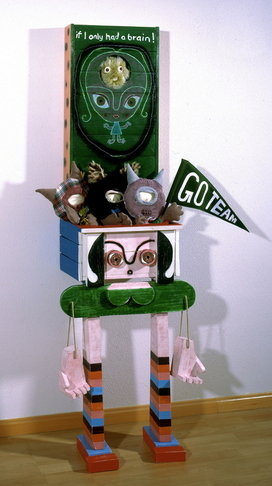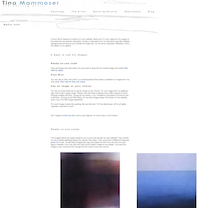Many artists have an unhealthy fear of having their images stolen and used improperly. This fear can cause you to fall behind in your race to the top. These artists hunker down and do so much to “protect” their images that they discourage legitimate people from helping them promote their work.
Last week I told yet another artist that I’d love to feature her work on the Art Biz Blog, but that I have a policy against using images with a watermark through the center—as hers had. I don’t mind an inconspicuous mark at the bottom or side, but I do mind a big © that stretches the width of an image. There is no way that art can be fully appreciated with that kind of interruption across its surface.

Sure, artists could send me clean images sans watermark to use on my blog, but I refuse to link to a site where images are covered with watermarks. I won’t waste my readers’ time by encouraging them to click through to those sites. They’d only be disappointed in the end.
Protect yourself as best you can by registering and posting your copyright and by documenting your progress. But, if you’re going to put your art online, do it because you want to show it off. Don’t hide it behind virtual lock and key where no one can see it at its best.
How do you encourage people to talk about you and your art and protect your images (as best you can) at the same time?
Here are two beginning steps to take.
1. Add a credit line to every image you post on your blog or website. If you don’t have your name, date, and image details with every picture, how do you expect others to treat them? Yes, EVERY image of your art should have this information! You wouldn’t install your art in a gallery without a label next to it, so why do it online? See how it’s done.
 2. Add a media room for bloggers. I wrote about this on my blog last week when I encouraged museums to do this in conjunction with their No Photography policies. You can adapt this idea for your own use, but it only works if it’s easy to find the media room!
2. Add a media room for bloggers. I wrote about this on my blog last week when I encouraged museums to do this in conjunction with their No Photography policies. You can adapt this idea for your own use, but it only works if it’s easy to find the media room!
Update: One brave artist took me up on my challenge! See Tina Mammoser’s Media Room.
As I was writing this newsletter, Michele Renée Ledoux sent me an email. I featured her work last week in this newsletter and on the blog. On that day, her website traffic nearly tripled! She wrote:
Now, I realize some artists might respond by saying, “But, how many sales resulted in this upsurge of hits?” My answer is that it doesn’t matter. Exposure is exposure. Statistically, I have more of a chance of selling my work if I expose my work to more people.
Michele gets it! She got nearly 3x the visitors that day because I showed off her work.
FINAL WORD: Do what you can to protect your images properly, but don’t be so fearful that you miss out on opportunities for others to promote your art for you. Make it easy to be talked about!



27 thoughts on “Make It Easy for Others to Promote Your Art”
Wow, a media room! For artist sites! Talk about a “slap your forehead” moment. I loved your post for museums but didn’t make the lateral connection.
I’m going to add it this week. 🙂
I had watermarks on my website and decided to take them off. And this is how I came to my conclusion…
For me, the purpose of making art is to express my innermost thoughts and feelings about life. My artwork invites introspection and is easy to relate to on many levels. I have always disliked the way many traditional venues for exhibiting art create intellectual barriers between the artwork and the observer. I have always tried to explain my art without highfaluting jargon, and to explore ways of allowing interaction with my work by making kinetic sculpture and hand-cranked automata. Currently, I am keen on finding art venues that allow for fun installations and learning events as part of the art exhibit. Keeping all this foremost in mind, I have had to ask myself: Are not these watermarks a barrier, and why would I create a barrier on my website when my process of making art involves removing barriers???
All other considerations fall to the wayside once I focus on the purpose
of my art. I am learning every day about being a better business person, and sometimes I think I am making improvements only later to discover I was wrong. However, when I focus on the purpose of my art, I have no doubts whatsoever. As usual, my process of creating art teaches me about life. This time the lesson is for me not to lose focus of what my art is about even when I grapple with issues such as protecting my images.
What are your thoughts on Creative Commons?
It is a bit disappointing to hear comments like this. We are artistic and creative people with the ability to look beyond the watermarks. Having a watermark doesn’t make it any more difficult to promote an artist’s work. To not promote artist’s who chose to try and protect their work against online theft is only a personal choice you have made.
Over the years I’ve played with all manner of marking my images, from just a caption underneath, as you’ve described, to full blown watermarks. After having several of my images, where I kept the watermark inconspicuous, not only stolen, but hosted on another site where they were selling smaller prints, cards, etc. I’m back to putting a more conspicuous watermark on. It’s not the first time this has happened. The time, costs, and frustration of having to deal with these thefts means, for me, my images will have watermarks. There are also licensing obligations to consider when the images are stolen and used for profit. If the consequences of placing prominent watermarks are that someone won’t link to my site…..so be it. I’d rather not watermark my images, but I’d also rather people didn’t help themselves to them and then turn around and try to profit from it themselves. Sorry for disagreeing with you on this issue.
Tina: Let me know when you have the media room up. I’d love to see it.
Alex: Thank you for your thoughtful insights. I love this: “All other considerations fall to the wayside once I focus on the purpose
of my art.”
PC: I absolutely love Creative Commons. In fact, I need to get my CC license back up on this blog.
Roberta: You don’t have to be sorry for disagreeing with me. I welcome thoughtful (and civil!) debate. I realize this is a hot issue and that my stance may be controversial with some. You do what you have to do. Licensing is a whole separate issue from selling fine art. Many artists who license have their licensed images under a password-protected site. I don’t consult about licensing, so I don’t know the ramifications of this. Thank you for sharing your experience.
PS Roberta: I just checked out your watermarks and they’re perfectly fine! As I wrote above: “I don’t mind an inconspicuous mark at the bottom or side.” I guess yours are a little conspicuous, but at least they’re at the bottom and not through the center of the image. Much better.
I do have a © on my images, but it’s in a corner and never hides the work. I know I need to be a little better about labeling my work, at least as far as measurements go. But I have to say that I’ve gotten jobs from people seeing my work online, so it pays to get out there!
Conspicuous watermarks do turn me off too, but it seems society is getting more tolerant of copying. The attitude seems to be; “after all its not like you’re stealing it”. I wonder to what extent art education is contributing to this. I think learning about art by copying masters is a great approach, but do the majority of institutions using this technique stress why it’s OK to do this in an educational setting, bit a big no-no in a commercial setting? I hope so.
Also, following the registering link, was a bit of a downer to me. The cost of showing your work just keeps on growing! Let’s see: say $250 for framing, a $50 entry fee, $60 bucks for the container (and if it sells you don’t get the container back), $50 for shipping and now $45 for copyright registration. Thank goodness the latter is a one-time fee. And the artist gets 30% to 50% of the sale price. Hey, I finally get it. This must be what they mean by “paying your dues”. 🙂
Alyson,
Was just wondering if you believe that an artist with a new body of work should follow this same advice and roll out the work (images) on a blog, Twitter, FB, etc? Or, is there a better strategy for marketing the new work?
Would love to hear what you and what others think.
Awhile back I became quite frustrated to find much my blog content stolen off my blog (interviews, guest writers, time consuming resource lists).
I’ve also found my art reproduced on etsy and zazzle and it’s an endless task keeping up with it all. The truth is, if you look hard enough, you will find your content lifted all over the place. My joke to myself is, “I just hope whoever steals it, makes a lot of money because my attorney would love to sue them.”
But seriously, I agree the artists immobilize themselves in fear of art theft. It happens to me all the time and I’m still alive and somewhat calm.
But look at it this way for example: I have about 800 visitors come to my blog a day — if 800 people showed up to my house every day, I’m sure I”d lose some silverware out of the kitchen drawer — but I also might meet my favorite actor Jim Parsons or the owner of Target. Hey, what odds do YOU want? I’m playing on that casino table.
I keep my images small. On my blog they are 72 res with the largest pixel size at 320. I make it a little bigger on my website.
This size is big enough to see the image, quick to download and small enough that folks can’t make good prints.
I agree with a lot of this. Part of the reason I don’t put huge watermarks on my images is for the purposes of allowing other to collect and promote my work. As a result its gotten around and students have even come to me to ask to use my information and images so they could do a report on me as their favorite digital artist!
I just read this article about protecting your images. It talks a lot about watermarks but also about linking to your copyright page. http://www.smartplanet.com/technology/blog/thinking-tech/how-to-protect-your-copyrighted-images-on-the-web/3684/?tag=content;col1
Wendy: Thanks for that link. I’ve just been reading those posts and comments for the last 20 minutes. Boy, those folks are angry! It’s clear that illustration © is very different from fine art. Those people make a living off of selling reproduction rights. I do think we’re living in a world with pre-Internet © laws. I can see both sides, but always favor artists’ rights–as long as they are helpful to the artists.
I’d love to see some sort of “Pay $5 to use this on your site” option for artists. But I fear that the authors of the blog posts would only go to the free versions.
I like the credits on the photos of Marcus Maschwitz. Very simple and clear.
http://www.marcusmaschwitz.co.uk/photography-portfolios-portrait-individual/
Thank you for confirming that a watermark across a work of art detracts from the art. Paintings on my website are copyrighted, however, anyone can copy a photo of one of the paintings whenever they want. If they like it enough to copy it, (I know someone who just made his desktop image from one of paintings) that means that my work is getting out in the world even more. Great!
Ann Marquis
http://www.hartmarquis.com
http://www.annmarquis.com
Just a quick reply on the creative commons – I have a set of photography I offer up on Flickr as creative commons. I had to think about it quite a bit not because I really worried about people using it (I actually *wanted* them to) but because I had to consider future potential uses. If you think you might want to use images with a publisher in future then be careful as you may then need to assign limited or exclusive rights. If you’ve allowed creative commons use of the same images there can be a conflict. So I wouldn’t put CC on any images I might want to use as limited editions or published pieces in future years.
Oh and thanks so much for including my page! It was a challenge because I was determined to go techy and work out the code bits. The geek in me loves that stuff.
I’d love to see other artists’ pages too if they make them. Everyone share!
Pingback: Twitter Tweets of the Week from @abstanfield — Art Biz Blog
Actually, since 1991, the federal law on copyright became: by virtue of the fact that the artwork was created gives it automatic copyright. I know this for a fact because of a legal issue I went thru.
Pingback: Art Marketing Action Podcast: Make It Easy for Others to Promote Your Art — Art Biz Blog
Maureen: The law is more complicated than that. It’s actually works since 1970, I believe. And all legal peeps believe that registering copyright is an extra layer of protection. You also have to prove in some way that you created it. Registering and posting online (with a date) can help toward with this burden of proof.
(This isn’t legal advice. Be sure to consult an attorney for details.)
Pingback: Why Some Artists Shouldn’t Have Blogs — Art Biz Blog
Pingback: Guest Blog Posts Encouraged at Art Biz Blog — Art Biz Blog
Pingback: Get a Grip on Why People Buy Art — Art Biz Blog
Pingback: Give people the tools they need to promote your art and events — Art Biz Blog
Alyson,
I have been an artist for 35 years and am just now getting involved with selling on the internet. Most of my most recent work is painted and drawn digitally, and I have my work online at: http://ArtForClarity.imagekind.com/. My website is being built, so I am trying to promote however I can by e-mail and word of mouth. I do not use watermarks now – perhaps that will change. Your blog is impressive and very helpful, so I will visit whenever I can. If you have a chance, visit my galleries and comment.
if you are so inclined.